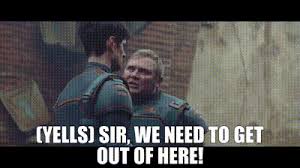Finally have a spare moment for some more feedback:




I'm so relieved the amnesia was temporary. This story could've gone down a much darker route otherwise.

Ian and Ed in the Bavarian chateau together was very sweet and wholesome. I know want a sitcom of just that.
That's how aging works. Everyone grows up, and the young eventually, hopefully, take care of their parents. It's a strange symmetry.Eloise’s mind was full of her father. Suddenly he was a child and she was taking care of him, as he and Marion had once cared for her. Whenever her father had come to mind over the past years, which was daily, the image was always of him in the prime of his manhood, her father…and she always his little girl. Suddenly the mortality of his frame was a present and visible reality.
They are now forced to beg for mercy from the Soviet tyrants. Nothing has changed.and that for a period I and my fellow Germans were forced to beg for mercy at the hands of the Allied tyrants.
A man like the Fox only understands money. But if he thinks he can get more money by betraying you, then you're out of luck.“You just have to know how to deal with him.”
Schlaukopf has tried to play both sides, so ends up with nothing. A classic comeuppance!“You cannot arrest me,” rasped Schlaukopf in as agitated a voice as he was capable of, backing slowly away from the suddenly hostile interview. “I am still the only one who can deliver the Englishman to you.”
Reminds me of this:He turned and ran to his chief, who still stood stupidly numb at the scene before him. “Come…come, Herr Adler!” he urged, trying to wake his boss to the imperative and renewed need for haste. “They will get away if we do not intercept them.”
“Get away…who…?” mumbled Wilhelm.
“The Englishman and the escaped prisoner. They are not coming here at all. We must hurry!”
“I do not…what do you…”
“I know where to locate them…if it is not already too late! Come…we must take the helicopter!”

One must always try, you never know what might happen.I will probably be too late. But I have to see if there is anything left I can do to help.
Desperation and anger makes people do strange things. Wilhelm's love is possessive, not genuine, so the moment his ability to possess and control her (through Heinrich's imprisonment) slips away, he snaps.Wilhelm leaned out of the cockpit, took aim, then threw the explosive toward the van, heedless now of the thought that he was attempting to kill the very woman he had tried to convince himself all these years he loved.
NO!She lay crumpled on the ground dead.
No...No...“Have you remembered anything since waking?”
The slow movement of the head this time went the opposite direction.
I'm so relieved the amnesia was temporary. This story could've gone down a much darker route otherwise.
This has horrible implications when applied to Wilhelm and Eloise's relationship.She whom he had been chasing ceased her flight, not because of a friendly touch, but because she realized the futility of fighting her pursuer any longer.
Glad Ian came to the same conclusion as me: how can he trust these "official" reports?Investigations indicate that the pilot of the helicopter and his passenger, an unnamed official, were both killed. The number of passengers in the van has not been determined. Officials from the GDR report only that there were no survivors from the attempt. Estimates range from three to six deaths among the escapees in all, but no official reports have been released.
The thread is fragile now, anything could snap it. But it will grow stronger with time.So he had clung by a slender thread to his belief. To give it up would be to relinquish what they had shared together…and that he would never lose sight of.
This is like a line from a movie!“Break in!” repeated Ed. “People are trying to get out of East Berlin…and you want to break in?”
Korsch, Galanov, and Wilhelm are all alive then. Bad luck for Ian.Uncle will be annoyed that he almost laid his hands on the old rabbi he was seeking
I really like how you develop the minor characters and show their importance. We may never see Lola again, but she has made a choice that will ripple throughout the rest of the story.Adler would kill for what she possessed. He had already killed for it, though unsuccessfully. To divulge it, however, would be to doom her own chances to turn the inclination of his affections in her direction.
Ian and Ed in the Bavarian chateau together was very sweet and wholesome. I know want a sitcom of just that.

